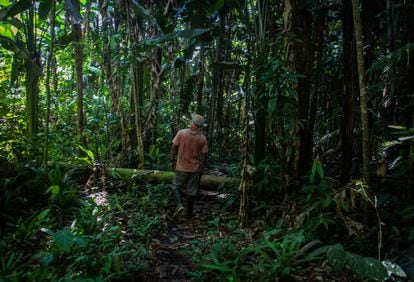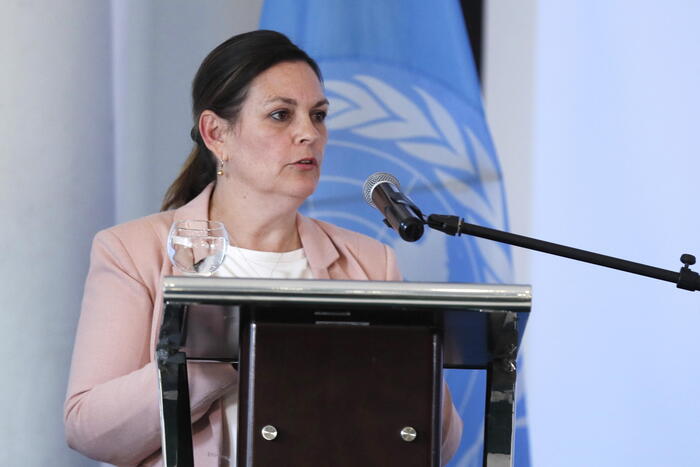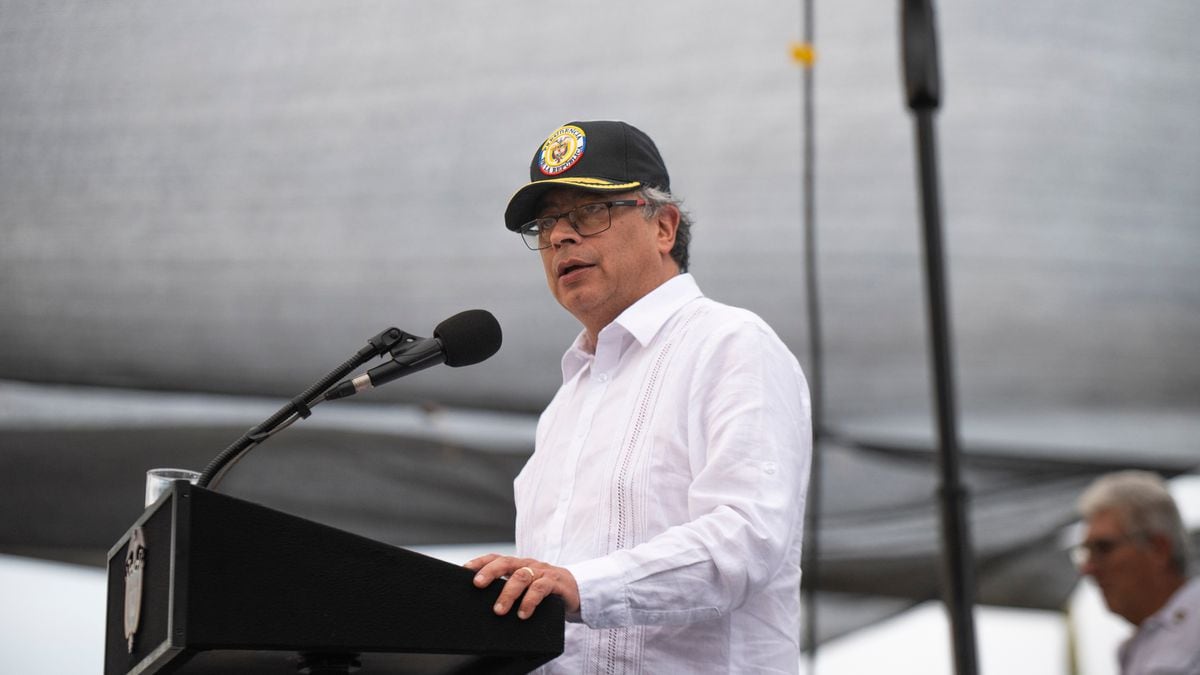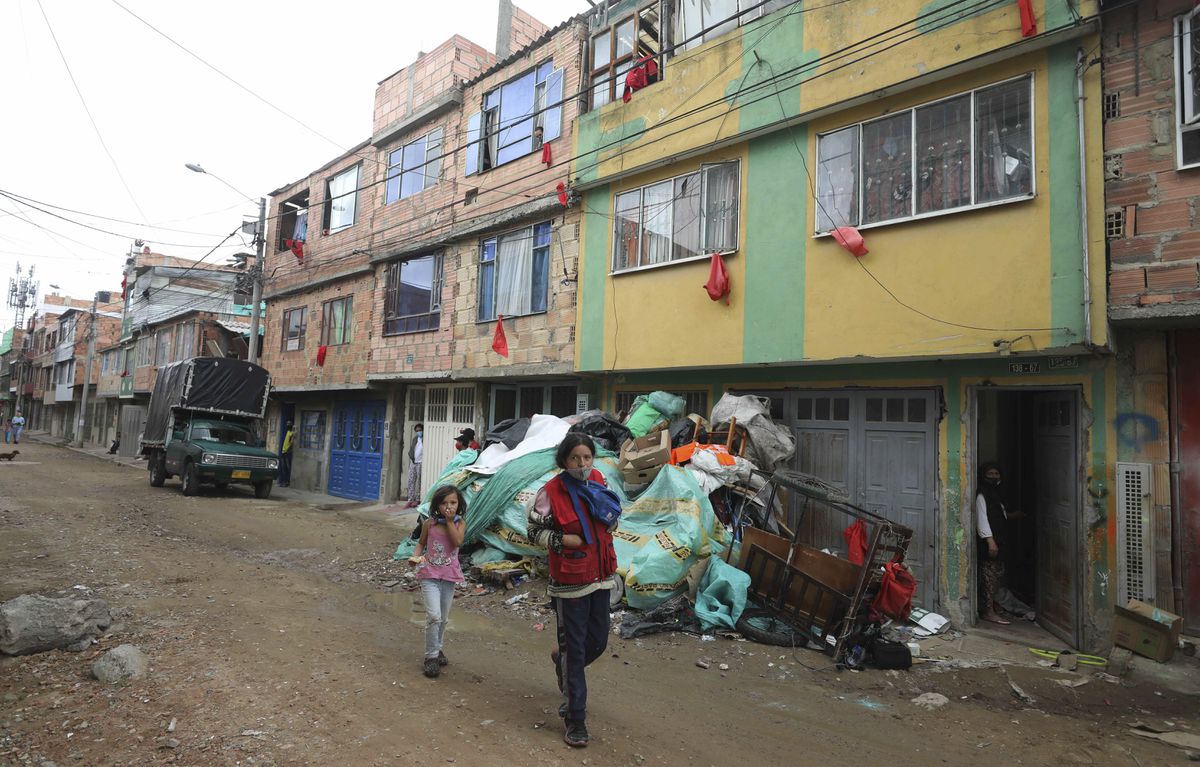Flying through the Amazon jungle, the pilot, a former Brazilian colonel, descends from 1500 to one thousand meters above sea level to approach the majestic Puré River.
The Puré crosses the border between Colombia and Brazil, a site that has become strategic for illegal mining and drug trafficking.
In its channel more than 30 mining vessels can be seen from the colonel's plane – tirelessly working to extract gold, illegally, from its waters.
In 2015 the National Parks of Colombia built a cabin called Puerto Franco in honor of the researcher Roberto Franco, the first to discover isolated indigenous peoples in Colombia, people who during the last centuries have decided not to have any contact with Western civilization.
From the air, only remains of the cabin built in honor of Franco can be seen.
Illegal armed groups burned it down during the pandemic.
This cabin had a very important purpose: to protect the isolated indigenous people of the Colombian Amazon.
Indeed, in the depths of the Amazon jungle, very close to Puerto Franco, live the Yuri, an indigenous group that lives in voluntary isolation.
The Río Puré National Park was created for their protection and along with it the most remote cabin in Colombia.
Park ranger Luis Rivas, 70, a traditional expert from the Cubeo ethnic group, lived here, charged with keeping illegal miners, drug traffickers and guerrillas away from the isolated indigenous people.
Puerto Franco cabin, after being burned by illegal armed groups in Río Puré, in December 2021.PNN Río Puré
One night, in the midst of the pandemic, Rivas dreamed that he was in danger and asked Parks officials to remove him from the area.
When he reached the nearest town, he caught Covid-19 and died.
Some time later, officials from the National Parks found out about the destruction of Puerto Franco during a flight over the Puré River.
Since the pandemic they have been unable to access protected areas in the Amazon due to threats from illegal groups that now dominate this territory.
The rangers of this national park, like those of nine others in the Colombian Amazon, which covers almost 15 million hectares, had to leave their territory from one day to the next.
“We had to send a plane and get everyone out.
There was no time, they threatened us, ”says a former National Parks official who prefers not to give his name to him for fear of reprisals from the guerrillas.
This former official believes that these threats respond to the implementation by the Government of the Artemisa strategy, a program to stop deforestation in the Amazon.
In 2020 Colombia was the most dangerous country for the second year in a row for environmental defenders.
According to the British NGO Global Witness, 65 environmental leaders were murdered.
Although this crisis has been brewing for decades, it has worsened since the signing of the Peace Agreement between the Colombian government and the FARC guerrillas in 2016. “The organizations that try to protect the Amazon have come into conflict with the interests of these powerful groups .
and, as a consequence, they have increasingly become targets of attacks”, explains Juan Carlos Garzón, a researcher at the Ideas for Peace Foundation.
“I am threatened by the guerrillas,” says anthropologist Arturo, 45, who prefers not to give his real name precisely for this reason.
He has walked through the Amazon region with a security detail since he reported to the Comprehensive System of Truth, Justice, Reparation and Non-Repetition in 2020 that the Carolina Ramírez guerrilla group arrived one day at the park cabin where he worked and told them that they had to leave.
“They told us that they had declared war on Parks and that they did not want uniform whites in the protected areas,” he recalls.
An indigenous Ticuna, in the Colombian Amazon jungle. Anadolu Agency (Getty Images)
The guerrillas stole their gasoline, cameras, computers and all the material they used to study the terrain.
“They only left us a small motorized boat to get out,” says Arturo, who decided to leave as soon as he could when he saw his life in danger.
Since that time two years ago, whenever he has tried to return, so have the threats.
Indigenous officials remained in charge of the parks while Arturo tried to continue leading the projects as best he could from a distance.
However, he recently decided to leave his post: the situation, he says, was becoming more and more frustrating.
Arturo was part of a group of park rangers who brought a report to the Truth Commission and the Special Jurisdiction for Peace in which they asked to be recognized as victims of the armed conflict, considering that the guerrillas “took us out under threat and everything was abandoned.
I feel very powerless,” he says.
Arturo wonders, what did National Parks do with those who are threatened for trying to take care of a territory that belongs to everyone?, although in truth he knows the answer: nothing.
According to official data, 12 park rangers have been killed between 1994 and 2020.
The deputy director of National Parks of Colombia, Carolina Jarro, explains that at the moment they are under very strong pressure from illegal mining, a business that they estimate represents close to three billion Colombian pesos in profits for criminal groups each year.
The proceeds, moreover, are used to launder the resources obtained from drug trafficking: “Attempts have been made to control illegal mining in the Puré River because the uncontacted indigenous groups are there,” explains Jarro, citing the burning of the Puerto Franco cabin.
The deputy director also notes that the guerrillas do not stop at threatening the park rangers, saying that they have stolen material from the organization that the rangers need to do their work.
“Groups outside the law prefer not to have anyone to see what happens, that's why they kicked us out,” Jarro says
Two illegal dredgers (facilities whose purpose is the extraction of minerals found under water. In this case, gold), on the Puré River, in the Amazon. Camilo Rozo
Although officials are currently unable to be inside the parks full time, they are using remote sensing technology to monitor activity in these protected areas.
“We can see when the guerrillas build a house, when they create a road.
Thus, we can file criminal complaints about the damage that is being done.
We have not abandoned the place, we have to go out for protection.
But we are always watching,” Jarro says firmly.
Jarro has worked as an official in a park in the Amazon region for the last 10 years.
A trained sociologist, she climbed the ranks of the administration before becoming head of a specific area, the name of which she cannot reveal due to the threat from the guerrillas.
Her mission has been to protect a group of indigenous people who emerged from isolation some years ago, only to be enslaved by the miners and rubber tappers who exploited the area's resources.
Now, many of these indigenous people, from the Nukak ethnic group, are highly resistant to contact: “In the beginning, it was the indigenous people themselves who negotiated with the guerrillas so that they would let us enter and work with the communities.
There was never a bigger problem.”
However, after the peace process, everything changed.
“The guerrillas held me hostage for two days, and after that they told me that I couldn't set foot in the park again,” says Juana.
The government's response: Militarize
The only solution Colombia's national government has come up with has been to militarize these protected areas via a program known as 'Operation Artemisa'.
In 2020 President Duque said in an interview with the World Economic Forum that “our strategy for fighting deforestation is a combination of carrot and stick.
We're fighting against illegal activities that destroy the tropical jungle.
At the same time, we're building up nature-based solutions.
In the past two years, we have been able to reduce the rate of deforestation by 19%.”
Duque has since said his government is aiming for a 30% reduction overall.
This month the Minister of Defense, Diego Molano, announced that 10,000 million pesos will be invested in the military bases of La Pedrera and Tarapacá for the control of illegal mining and the fight against drug trafficking.
Esperanza Leal Gómez is Director of the Frankfurt Zoological Society in Colombia.
She says that protecting environmental leaders is the responsibility of the whole Colombian state, which must guarantee conditions for workers in the National Parks so they can “operate…without putting their lives in danger.”
Panoramic view of the Puré river, border between Colombia and Brazil. Lucía Franco (EL PAÍS)
Gómez explains that the park rangers are not only essential for the conservation of the environment, but that they keep those at bay who want to exploit it: “The most latent threat is the dispute over territory between various illegal armed actors and civilians, who are being left unprotected.”
The director of the World Wide Fund for Nature (WWF) Colombia, Sandra Valenzuela, agrees.
“As long as these threats continue, the national parks, their park rangers and uncontacted indigenous people will be in danger.
Colombia must find a way to guarantee security and ensure the survival of the lungs of the world.”





/cloudfront-eu-central-1.images.arcpublishing.com/prisa/USUWDBG7JJHATL4LN5CDIOB4XE.jpg)


/cloudfront-eu-central-1.images.arcpublishing.com/prisa/RSVSTQFDNZHWVNNUYWZ2MAMOUE.JPG)
/cloudfront-eu-central-1.images.arcpublishing.com/prisa/2AYD5L6JMJAJ7F7KWQUHPVVVR4.jpg)





